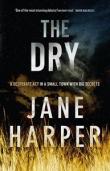 470902978410786559.jpg
470902978410786559.jpg
 470902978410786559.jpg
470902978410786559.jpg
'WHO REALLY KILLED THE HADLER FAMILY?
'Luke Hadler turns a gun on his wife and child, then himself. The farming community of Kiewarra is facing life and death choices daily. If one of their own broke under the strain, well ...
'When Federal Police investigator Aaron Falk returns to Kiewarra for the funerals, he is loath to confront the people who rejected him twenty years earlier. But when his investigative skills are called on, the facts of the Hadler case start to make him doubt this murder-suicide charge.
'And as Falk probes deeper into the killings, old wounds are reopened. For Falk and his childhood friend Luke shared a secret ... A secret Falk thought long-buried ... A secret which Luke's death starts to bring to the surface ...' (Publication summary)
 The Dry
( dir. Robert Connolly
)
Australia
:
Made Up Stories
,
2021
13199545
2021
single work
film/TV
crime
The Dry
( dir. Robert Connolly
)
Australia
:
Made Up Stories
,
2021
13199545
2021
single work
film/TV
crime
'When Aaron Falk returns to his drought ravaged town in Victoria to attend his best mate’s funeral, he finds himself drawn into a web of lies and murder, which forces him to confront the guilty secrets of his own past. Based on the novel of the same name, written by Jane Harper.'
Source: Screen Australia funding approvals.
Reports in late 2015 indicated that film rights to the then-unpublished novel had been bought by the film company run by Reese Witherspoon and Bruna Papandrea. The film was funded by Screen Australia for development by Papandrea's production company in August 2017.
Number 9 on the 2024 Better Reading Top 100
'This chapter investigates the response of the Australian novel to the Anthropocene. It considers ways in which new, speculative fictions have sought to represent deep time and planetary interconnection, and interrogates how this connects to long-standing settler-colonial relations to land. It considers such writers as James Bradley, George Turner, and Tara June Winch, and emphasizes the region of Western Australia as a place of particular environmental urgency.' (Publication abstract)
'Within the long history of Australian crime fiction, Jane Harper’s The Dry marks a significant moment in the emergence of what has been characterised as “outback” or “rural” noir. With its focus on the small regional community of Kiewarra, Harper’s narrative addresses a number of issues that impact rural communities, including climate change, domestic abuse and gambling. Weaving together a story set in the past and a story set in the present, Harper offers a compelling portrait of the moral and social impact of these issues on rural communities in ways that challenge simplistic assumptions about the limitations of genre fiction to engender empathy. While some have argued that only literary fiction can evoke the kind of empathy that enhances our experiences of the world, this article suggests this is not the case and that The Dry is a powerful and moving portrayal speaking to the effects of environmental catastrophe and domestic abuse within a genre that may appeal to a broad and receptive audience.' (Publication abstract)